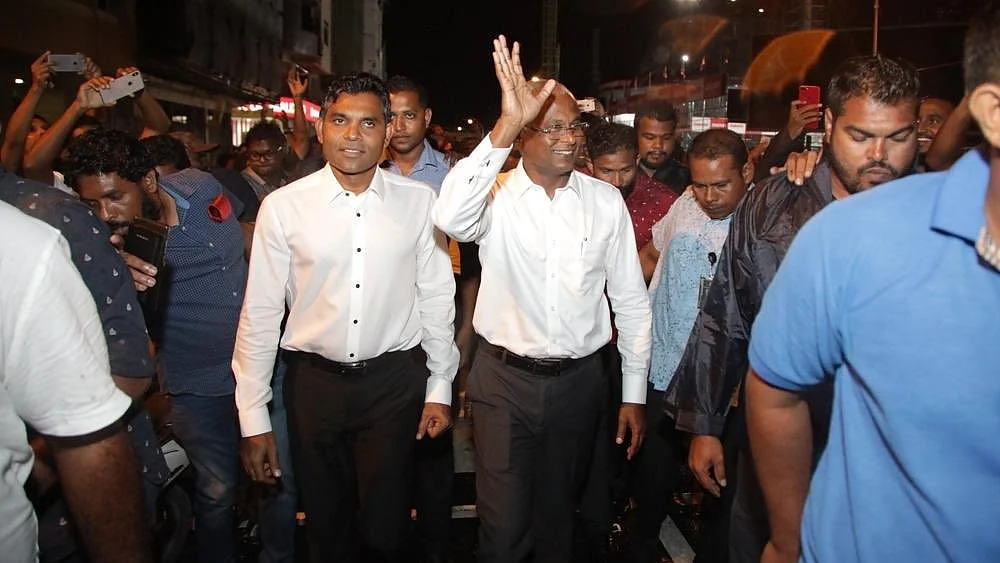Maldives: Yameen concedes, but concerns over Chinese influence remain
Maldives President Yameen Abdulla has conceded defeat after the presidential polls. However, experts worry whether Yameen’s departure would actually cut down Chinese involvement in the Maldives

Maldives President Abdulla Yameen has conceded defeat after an election loss to joint opposition candidate, Ibrahim Mohamed Solih of the Maldives Democratic Party.
"The citizens of the Maldives had their say ... and I accept that result," Yameen said in a televised address on Monday, September 24, hours after the country’s foreign ministry and the Election Commission declared Solih to be the winner of the vote that had seen a nearly 90% turnout.
Even as unofficial counting figures showed Yameen trailing Solih decisively and the MDP candidate claiming an early victory, silence from the Yameen camp so far had been causing anxiety among international observers and opposition politicians. Solih polled 58%, or 1,34,616 ballots, of the vote in contrast to incumbent Yameen, who trailed at 42%, or 96,142 votes.
Fifty-nine-year-old Yameen had been under intense criticism by the United States, European Union, India and the United Nations for jailing Supreme Court judges and cracking down on the Opposition politicians and dissent since he came to power in a disputed vote in 2013.
Saying that India must still be wary of Yameen, former Indian Navy chief Admiral Arun Prakash remarked that India should keep its military options on standby till he relinquishes power in November, when his term ends. He, however, added that any military move should have a diplomatic grounding. Prakash told National Herald that India must drum up international support and concurrently prepare itself for a multi-nation patrolling party in international waters around the Maldives.
“Firstly, we need to work on a diplomatic area. No military action can take place without the approval of the international community. This is a pretty good case that we have now,” said Prakash, adding “The first step is to drum up international support, probably seek support from the United States and maybe even United Nations.”
“We must concurrently prepare ourselves militarily and send out subtle military signals. A good idea could be to keep our vessels in international waters around the Maldives. This patrolling force could be a multi-nation effort, in order to ensure that the democratic mandate is respected in the Maldives,” said Prakash. “International support will pre-empt China from doing anything stupid,” said the former head of the Indian Navy.
“After the stunning defeat of the Maldives’ dictatorial president, the question is whether this archipelago will pull back from the brink of a Chinese debt trap (in Mahathir style) or whether it is already so indebted—as Sri Lanka was—that it will remain under Beijing’s sway,” tweeted strategic affairs expert Brahma Chellaney
Yameen’s economic policies, on the other hand, are blamed for pushing the Maldives in a Chinese debt-trap, since Beijing has emerged as a principal financial and political backer of Yameen.
China is involved in three major projects in the Maldives- upgrading the international airport, construction of a new bridge and the relocation of a port. Mumbai-based think tank Gateway House has said in a study almost $1.5 billion was lent to the Yameen government by China for the three projects, besides a guarantee of $370 million for the Chinese loan.
The International Monetary Fund has estimated that the public debt would balloon to 121 percent by 2020, making it rather expensive just to service the loan.
Anand Kumar, an associate fellow at New Delhi-based think tank Institute of Defense Studies and Analysis (IDSA) and an expert on India’s neighbourhood policy, said that the mandate in the Maldives has sent out a strong message to China. “Yameen had campaigned on a platform of development and a strong economy. China was a major backer of this government,” he said.
However, experts are still worried whether the election results would cut down Chinese involvement in the Maldives. “After the stunning defeat of the Maldives' dictatorial president, the question is whether this archipelago will pull back from the brink of a Chinese debt trap (in Mahathir style) or whether it is already so indebted — as Sri Lanka was — that it will remain under Beijing’s sway,” tweeted strategic affairs expert Brahma Chellaney.
Earlier in the day, India hailed the presidential vote on the tropical island archipelago as a “triumph of democratic forces in the Maldives.”
The Ministry of External Affairs said in a statement, “This election marks not only the triumph of democratic forces in the Maldives but also reflects the firm commitment to the values of democracy and the rule of law.”
Follow us on: Facebook, Twitter, Google News, Instagram
Join our official telegram channel (@nationalherald) and stay updated with the latest headlines
